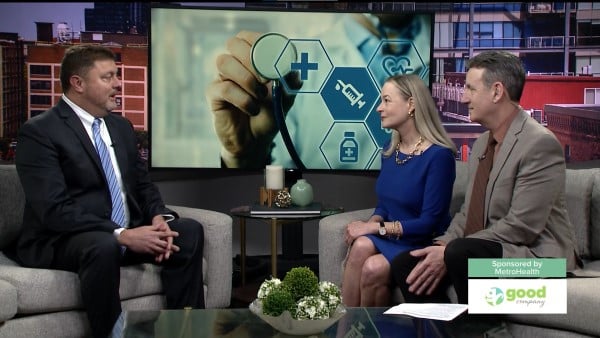Stroke Symptoms
Signs of Stroke You Don't Want to Ignore
Watch Jon Schrock, MD, talk about the warning signs of a stroke–the signs that tell you to call 911 immediately to get to the closest Stroke Center, including one of MetroHealth's four locations.

Time matters when a person has a stroke. Early treatment can help reduce disability from the stroke.
Types of strokes:
- Ischemic stroke is when a blockage of the arteries interrupts blood supply to the brain. This is the most common type of stroke.
- Hemorrhagic stroke is bleeding into brain tissue after a blood vessel bursts.
No matter what type of stroke a person has, early treatment is absolutely important. If a person has medical treatment in the first four hours of symptoms, MetroHealth physicians can administer intravenous medications called tPA clot busters that may minimize damage to the brain.
After four and a half hours, these clot busting medications do not work, according to Jon W. Schrock, MD, a stroke specialist in MetroHealth’s Department of Emergency Medicine.
BE FAST - Symptoms of stroke you should never ignore:
- Balance. Watch for sudden loss of balance.
- Eyes. Check for vision loss.
- Face drooping. Check to see if one side of the face droops or feels numb. If you smile, is it uneven or lopsided?
- Arm weakness. If one arm is weak or numb, that’s a cause for concern. Try raising both arms. Does one arm drift downward?
- Speech. If your speech is slurred, or if you’re unable to speak, it could be a stroke. Can you repeat a simple sentence, like “the sky is blue?”
- Time to call 911.
All MetroHealth Emergency Rooms are Stroke Certified
MetroHealth has a long history of providing the best stroke care possible. In fact, we are the only system in the area to have all of our Emergency Rooms stroke certified.
- MetroHealth Main Campus*
- Brecksville Health and Surgery Center**
- Cleveland Heights Medical Center**
- MetroHealth’s Parma Medical Center**
*Certified by the Joint Commission as a Comprehensive Stroke Center, the highest certification possible, and handles the most complex cases.
**Certified as Acute Stroke Ready Hospitals by the Healthcare Facilities Accreditation Program/Accreditation Commission for Healthcare.